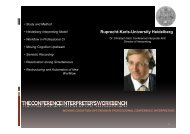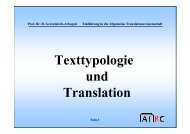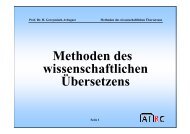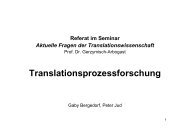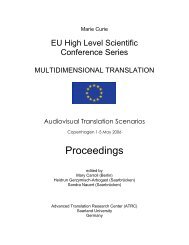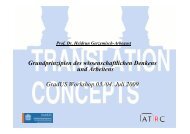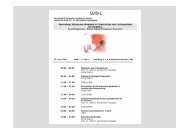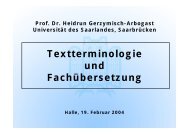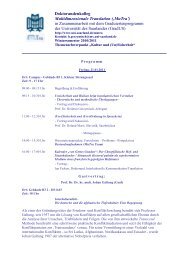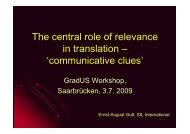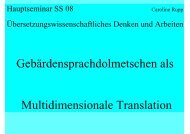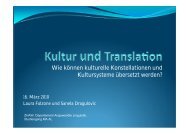Proceedings - Translation Concepts
Proceedings - Translation Concepts
Proceedings - Translation Concepts
Create successful ePaper yourself
Turn your PDF publications into a flip-book with our unique Google optimized e-Paper software.
MuTra 2005 – Challenges of Multidimensional <strong>Translation</strong>: Conference <strong>Proceedings</strong><br />
Nilgin Tanis Polat<br />
The word for word translation of “başlayabilirsiniz” is you can begin and<br />
“karıştırabilirsiniz” is translated as you can mix it up and “zaman ve uzaklıkların tümü<br />
üzerinden bir sünger geçer, hele şükür son anda zaman ve mekân sorununu çözdüğünüzü ilân<br />
edebilir ya da ettirebilirsiniz” is translated as time and distance remains far beyond, thank god<br />
you can announce or make it announced that you have solved the problem of time and space<br />
and “boy gösterebilirsiniz” is translated word for word as you can stand. The fact that the<br />
impersonal form is present also in the Turkish version, but that the translator does not prefer<br />
it, is here interpreted as an indication of the tendency that the impersonal form is not common<br />
in narrative texts and ’disturbs’ the flow of the speech.<br />
3.2 Emotionalization<br />
When comparing Yer Demir Gök Bakır and its translation we can note that the translator tends<br />
to reduce the effect of the blasphemies and rude expressions. Hence, as it is demonstrated in<br />
the above quotation, the adjective “belalı” is translated in the German version through<br />
conveying its meaning: it is expressed as over-shining sun, whereas in Turkish it is damned<br />
sun. In the German version of the narrative text, blasphemies and rude expressions are<br />
softened or not translated at all. While in Turkish, those expressions denote a certain<br />
closeness and intimacy between the narrator and the reader, the German text appears to be<br />
neutral in attitude. Not only the blasphemies, but also most of the emotional expressions in<br />
German appear more neutral and objective. For example, in order to underline the emotion,<br />
the translator adds punctuation marks missing in the source text:<br />
Am Vormittag hätte man sehen können, wie es die Großmutter verstand, das schlaffe Kraut zu<br />
ordentlichen Haufen zu rechen, mittags aß sie ein mit Sirup versüßtes Schmalzbrot, hackte dann<br />
letztmals den Acker nach, saß endlich in ihren Röcken zwischen zwei fast vollen Körben. (Grass<br />
1993:12-13)<br />
Öğleden sonra görecektiniz anneannemi! Doğrusu o ne beceriklilikti! Elinde tırmık, kurumuş<br />
patates yapraklarını güzelce bir araya toplayıp öbekler yapmış, öğleyin üzerine domuz yağı<br />
sürdüğü marmelatlı ekmeğini yemiş, derken tarlayı son bir kez çapalamı, nihayet eteklikleri altına,<br />
nerdeyse ağzına kadar dolu patates dolu iki sepet arasına çökmüştü. (Grass 2000: 10-11)<br />
Thus, the translation of “Öğleden sonra görecektiniz anneannemi! Doğrusu o ne<br />
beceriklilikti!” is You should have seen my grandmother in the afternoon! What a competence<br />
it was!<br />
The following excerpt also demonstrates how statements in the Turkish translation are<br />
emotionally stressed:<br />
Ob aber jener Läufer ein Koljaiczek gewesen, wußte meine Großmutter nicht, entschuldigte ihre<br />
Unwissenheit mit dem Feuer vor ihren Stiefelsohlen; das gäbe ihr genug zu tun, das bränne nur<br />
mäßig, deshalb könne sie sich auch nicht um andere Leute kümmern, die hier vorbeiliefen oder im<br />
Qualm stünden, überhaupt kümmere sie sich nie um Leute, die sie nicht kenne, sie wisse nur,<br />
welche es in Bissau, Ramkau, Viereck und in der Ziegelei gäbe – die reichten ihr gerade. (Grass<br />
1993: 19)<br />
Ama koşarak yanından geçip giden adam Koljaiczek miydi, bunu bilmiyordu anneannem;<br />
bilmemesini de çizmelerinin pençeleri önündeki ateşle bağışlatmaya çalıştı, ateşin yanması zaten<br />
yeterince uğraştırıyordu kendisini; baksana, şöyle doğru dürüst yanmayı bilmiyordu meret! Bir de<br />
yanıbaşından koşarak geçip giden ya da duman içinde dikilen adamlarla mı ilgilenecekti! Zaten<br />
tanımadığı kimseleri hiç merak etmezdi anneannem; bütün tanıdıkları ise Bissau’da, Ramkau’da,<br />
Viereck’te ve kiremithanede olanlardı, bu kadarı da kendisine pekâla yetiyordu.(Grass 2000:17)<br />
The translation of “Baksana, şöyle doğru dürüst yanmayı bilmiyordu meret! Bir de<br />
yanıbaşından koşarak geçip giden ya da duman içinde dikilen adamlarla mı ilgilenecekti!” can<br />
143



